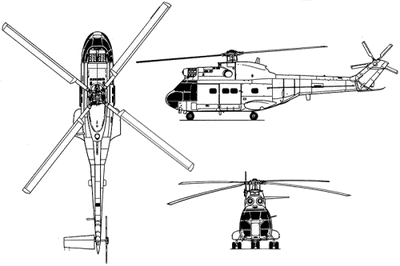Fri, Jan 24, 2014
Issued In Response To Offshore Oil Industry Super Puma Accidents
The U.K Air Accidents Investigation Branch is recommending that North Sea oil industry helicopter operators amend their safety briefings in light of an accident which resulted in multiple fatalities.

Special Bulletin S1/2014 was published on Thursday, January 23 concerning the accident to the AS332 L2 Super Puma helicopter, registration G-WNSB on Friday August 23. The accident occurred approximately 1.5 nm west of Sumburgh Airport, Shetland Islands.
This Special Bulletin is published to highlight a safety concern relating to pre-flight safety briefings, given to passengers, on the functionality of emergency equipment provided to them for UK North Sea offshore helicopter flights.
According to the bulletin, research has identified that in about 60% of all helicopter water impacts, the helicopter inverted or sank, immediately or after a short delay. A capsize often occurred before evacuation of the occupants could be completed. As a result, Emergency Breathing Systems (EBS) were developed to allow helicopter occupants to breathe underwater for a short period of time. The EBS can bridge the gap between the maximum breath-hold time of an occupant and the time required to complete an underwater escape, thereby increasing the chances of survival. EBS were introduced in UK North Sea offshore helicopter operations as a voluntary industry standard; at present there is no regulatory requirement for such equipment.
The pre-flight safety briefing material has been reviewed by the AAIB as part of its ongoing investigation. This has identified that the briefing material does not include fully representative information about the EBS. It does not highlight that the EBS provided may be a hybrid rebreather containing an air supply which is discharged automatically into the rebreather bag, or that the system can be used even if the wearer has not taken a breath before becoming submerged.

The AAIB has approached the main helicopter operators flying in support of the UK oil and gas industry, whose passengers are equipped with a hybrid EBS. Whilst operation of the hybrid EBS should be covered in initial and recurrent training, it is not explicitly described in the pre-flight safety briefing. The operators have undertaken to amend their pre-flight briefing material to include information that the hybrid system contains its own air supply which is discharged automatically, making the system usable even if the wearer has not taken a breath before becoming submerged.
More News
From 2023 (YouTube Edition): "Ain’t Your Daddy’s Super Cub”—Don Wade Co-owned by Don and Ron Wade—the former of Don’s Dream Machines, a storied >[...]
Pilot-Rated Passenger Reported That The Pilot Did Not Adequately “Round Out” The Landing Flare And The Airplane Bounced And Yawed To The Right Analysis: The pilot state>[...]
Dead Reckoning Dead reckoning, as applied to flying, is the navigation of an airplane solely by means of computations based on airspeed, course, heading, wind direction, and speed,>[...]
Aero Linx: Lake Amphibian Club This website is created and sponsored by the Lake Amphibian Club, to help spread the word about these wonderful, versatile amphibians that can land j>[...]
“I am deeply honored to be sworn in as NASA administrator. NASA’s mission is as imperative and urgent as ever — to push the boundaries of human exploration, ignit>[...]
 Classic Aero-TV: In Praise of Alabamas Patriot Aircraft USA
Classic Aero-TV: In Praise of Alabamas Patriot Aircraft USA NTSB Final Report: Cirrus Design Corp SR22
NTSB Final Report: Cirrus Design Corp SR22 ANN's Daily Aero-Term (12.21.25): Dead Reckoning
ANN's Daily Aero-Term (12.21.25): Dead Reckoning ANN's Daily Aero-Linx (12.21.25)
ANN's Daily Aero-Linx (12.21.25) Aero-News: Quote of the Day (12.21.25)
Aero-News: Quote of the Day (12.21.25)




